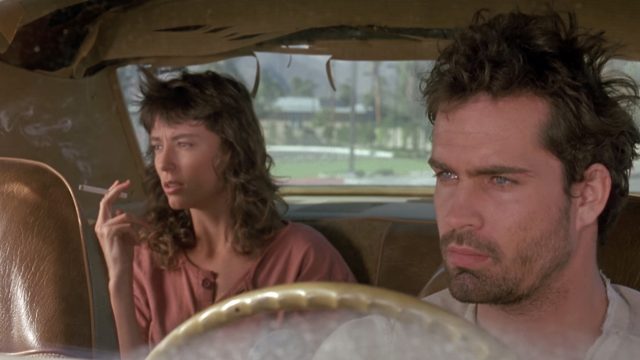James Foley’s After Dark, My Sweet shows a rare kind of tenderness, one that has little to do with sentiment and more to do with how meat is tenderized, how thudding blows can make it supple and ready to be consumed. Bruises are tender, too; tenderness is where we feel the ache. And we feel it here.
That’s because of Collie (Jason Patric), who might as well start the film by getting thrown off the hay truck about noon. There’s a subtly jarring quality about him: he has the demeanor of a hunted, wounded animal, and he talks too much and at the wrong times. He’s impulsive, fatalistic, and easily distressed. When Patric delivers Collie’s lines, he sometimes over-enunciates them; it’s a tendency that shows up not in his voice-overs but in his interactions, when he has something to prove. It gives his dialogue an odd, distinct force, as if he has to reach deep inside himself and wrench each word out one by one.
Collie was a fighter, and he once killed a man in the ring. He’s damaged, physically and mentally; he’s on the lam from an involuntary commitment. He tells rehearsed lies, and almost no one believes him. He can’t get a full glass of beer to drink in peace. He can’t get a ride.
The only people who want Collie are people who want to use him, and Collie understands and expects that. What he crave is someone who will need to use him, because that’s the only way he can see being loved: if people don’t need you, he explains at one point, they don’t really care if you’re alive or dead, and no one has ever needed Collie.
Until Fay Anderson (Rachel Ward). Fay picks Collie up but doesn’t have the heart to use him, and she’s a good enough person to try to drive him away from her. He comes back, of course. His only other option is being the kept boy of the sweetly controlling Doc, who manages him with handouts and genuine kindness and a little bit of fear, and Doc–as Collie himself says–doesn’t need him, not the way Fay does. There’s sex between him and Fay–the movie stops in its tracks for an unusually long montage to make this clear–but it’s not what he’s here for. He’s here to get her out of the trouble he can sense that she’s in, trouble which presents itself in the form of Uncle Bud (Bruce Dern). Uncle Bud is an ex-cop, a sleazy dreamer who lacks the chops and the bravery to be as bad as he would like. He has a kidnapping plan that he’s been pestering Fay about, and Collie’s sudden appearance gives Bud a way to go through with it and shove all the risk and consequence onto someone else.
The plot is well-handled and paced with noir’s signature sinister tread towards doom, and while all the performances are strong, Patric in particular is terrific. He has to pull off the difficult balancing act of making Collie simultaneously off-putting, tough, vulnerable, controlled, in over his head, romantic, pitiable, tragic, and heroic; he can’t be too smart, but he must be believably smarter than any of the people around him understand. The friend I watched this with pointed out that his social interactions exist at a particularly painful point on some sliding interpersonal scale: he understands enough to know that he’s coming across badly, but he doesn’t understand enough to change that. He’s a man who lets himself be nicknamed after a dog because he recognizes in some way that he’s going to wind up being owned, but he has enough unexpected will to determine who owns him and what kind of tool he will be, and that gives his fate an unexpected grandeur.
After Dark, My Sweet is streaming on Tubi.

